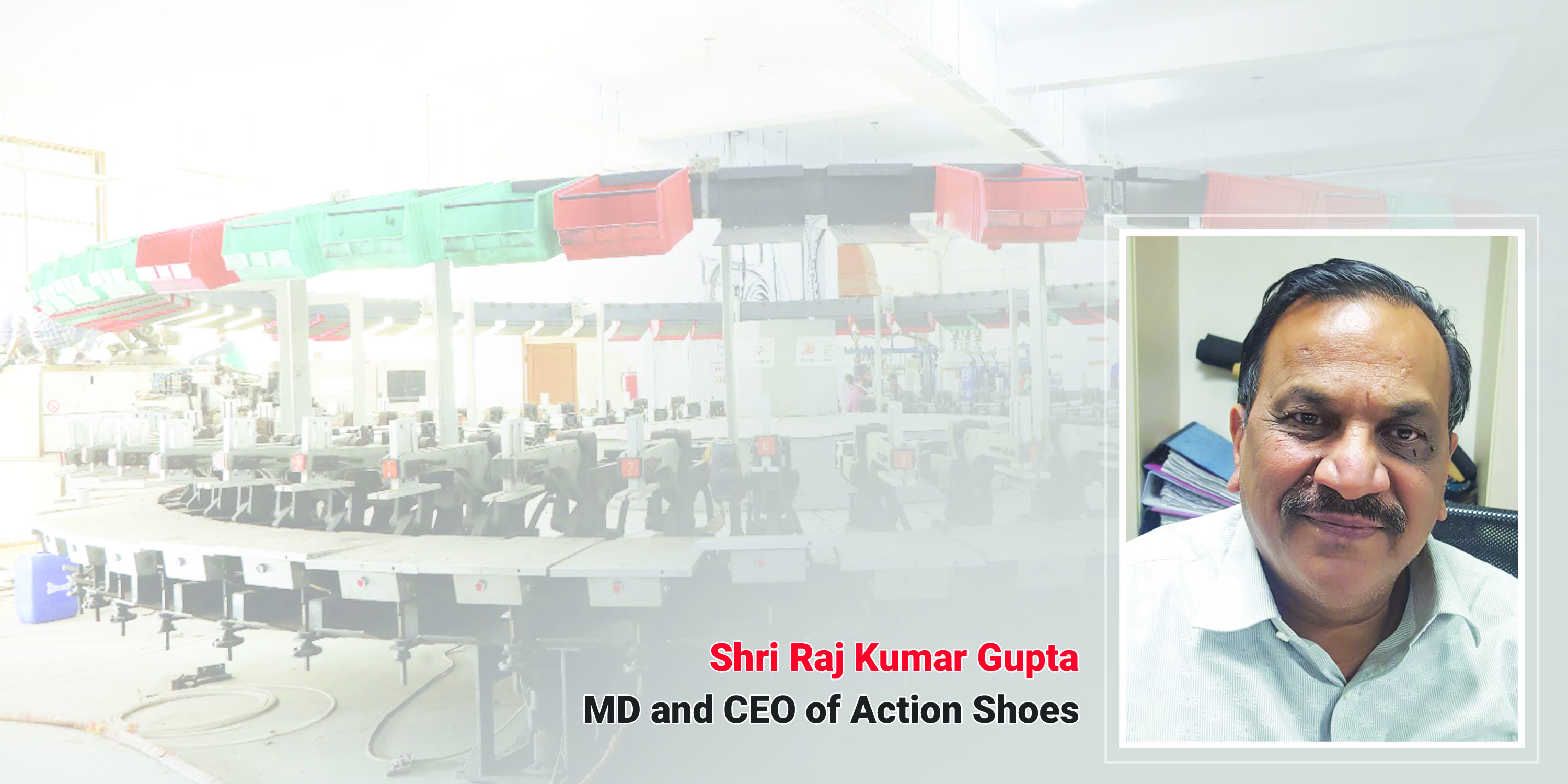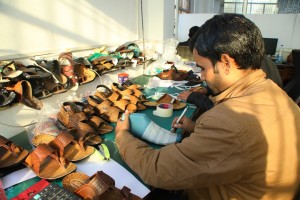



How In-House Training and Support for Startups Can Transform Business in The Footwear Segment

“Skilled manpower is the basic need for any segment in the employment-intensive leather industry. Particularly in the footwear industry, there is huge loss in productivity and quality since many factories employ unskilled or semi-skilled workers.” Emphasizing on various aspects of skilling and entrepreneurship in this sector, Shri Raj Kumar Gupta, MD and CEO of Action Shoes, shares his insights on the need for setting up in-house training centers, promoting startups in component segment and facilitating the use of latest technology for overall growth in the footwear sector.
Challenge – availability of skilled human resources
Let me start by sharing some interesting numbers. In India, per capita footwear consumption is expected to increase up to four pairs, while domestic footwear consumption is expected to reach up to five billion pairs by 2020. Are we ready to meet this demand with quality products? To me, skilled workforce and infrastructure are most critical aspects of manufacturing. However, unlike places like Agra that has been a hub for many leather trades, we don’t have good infrastructure and skilled worker in places like Delhi that has close 1000 leather units. Even though in Bahadurgarh has Footwear Park with 300-400 units in the non-leather segment, we have a shortage of skilled labour since workers from Chennai, Ambur or Agra wouldn’t want to migrate.
Skill development and R&D focus
Today, the industry doesn’t participate actively in on-the-job training. In fact, the industry owners themselves have to be trained so that they appreciate the need or training their workforce. We need to convey the significance of skilling to the
Entrepreneurs. They should know that without skilling they will not be able to produce the desired products with less raw materials and lower price, delivering quality output with aesthetic designs. Nevertheless, there is good awareness about skilling in the industries located in southern India.
If we have to compete with China, the need of the hour is not only the skilled manpower; it is also the aesthetic look of the products. For this purpose, we need to get people from FDDI and other research institutions since we need expertise in better design and product experience. This will also improve the quality of the products.
Best practices from Action Shoes
At Action Shoes, we believe in being our own competitor hence we continuously improve our products and upgrade them using latest technologies and skilled workers. For this purpose, we have in-house skilling programs that equips our workforce with right knowledge and skills to use the raw materials and work on semi-finished or finished products. Our processes have become more systematic ever since we’ve moved to KRM KPA. This is an example of how technology combined with skills can become the key differentiator for your business!
One of the grave problems facing leather industry today is the use of obsolete technology, processes and production methods. This makes it difficult to deliver quality output at competitive prices. However, slowly, we see awareness among the entrepreneurs and employees that they are answerable on this account and they understand the need to modernize and move with times.
 Entrepreneurship
Entrepreneurship
Startups in footwear industry have great scope to grow their business in the component segment by creating huge employment in different regions.One of the ways to create awareness about entrepreneurship opportunities is through ‘melas’ or small exhibitions and trade fairs in places like Madhepur where about 2000 leather factories are located. Unlike the practice of holding big exhibitions in the cities where people from districts cannot afford to travel, we need to decentralize our marketing efforts to attract more youth and motivate the startups. At present there is no single platform for getting all the relevant into for startups. Despite this, many new ventures are coming up and entrepreneurs are growing by leaps and bounds. We need to create new avenues for those coming from institutions like FDDI so that they can become entrepreneurs; they must be assisted with mentoring, market linkages and financial support.
Apprenticeships
Most people in the leather industry are not aware of apprenticeships as a win-win way of building a talent pool. We need to inform them about the benefits of National Apprenticeship Promotion Scheme (NAPS) and how it has done away with old laws and created an employer-friendly incentivized scheme to engage apprentices even in MSMEs.
 Facing competition with right skills and technology
Facing competition with right skills and technology
When compared with China, our production cost is quite less when it comes to procuring the raw material. In footwear industry about 15% to 20% is the cost of manufacturing, this includes labour, power or infrastructure. China can produce 2 pairs of footwear with the same infrastructure while Indian can make only one since they can produce 10% to 12%. Hence, even though raw material is cheaper in India, we cannot compete on price. Perhaps, when the startup system evolves in the component industry, we may see considerable development in the wholesale market leading to tangible benefits. Unlike China, India does not have wholesale markets for purchasing machinery and tools off the shelf.
I urge all industry members to start on-the-job training schools in their own factories, however small they are. This will help them train their employees as per their needs and deliver better quality, be more productive and efficient. We cannot afford to take the risk of leaving the employees to learn on their own! At the same time, new entrepreneurs must be motivated through appropriate training and they should be encouraged to set up more component industries.
Making jobs in leather sector aspirational
There are definitely positive signs towards making leather an aspirational sector for employment. This should be complemented with more courses in vocational skills and research programs by opening more institutions in and around the industrial areas. I have two suggestions in this regard:
One, the government should open the institutes in the heart of the industry, so that interested people can get trained in right skills and acquire relevant knowledge. This will also enable the children of existing entrepreneurs to enroll in such courses for formal certification. Two, international level institutes must be opened to teach design and promote research, again this should be close to leather hubs like Bahadurgarh, Ambur, Kanpur and other locations.